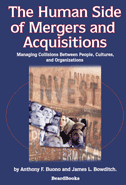|
|
|
|
||||||

|
The Human Side of Mergers and Acquisitions: Managing
Collisions Between People, Cultures, and Organizations By Anthony F. Buono and James L. Bowditch 2003/03 - Beard Books 1587981769 - Paperback - Reprint - 339 pp. US$34.95 This impressive study has many lessons to teach about the role that human resource considerations should play in any large-scale organizational change. Publisher Comments This eye-opening study, based on the authors' direct and personal observation of a bank merger, has three basic analytical focuses: the human issues presented by mergers at both an individual and a cultural level, the organizational issues that these human concerns raise, and the resulting implications for managing the merger and acquisition process. With keen insight, the authors delve into a complex web of reactions. The intrigues, cultural clashes, hostilities, and tensions that emerged from this "friendly" merger are mind-boggling. From the back cover blurb: ... The dynamics that characterized the dual nature of the merger run the gamut of human responses to a stressful situation: trust and betrayal, openness and deception, hope and despair, support and retaliation--all driven by nascent opportunities or restricted options... Review by Henry Berry, Turnarounds and Workouts: As Buono and Bowditch point out from the start, there are inevitable “collisions” in any merger or acquisition. One term common to mergers and acquisitions – hostile takeover – denotes collision. However, the coauthors also note that “even friendly, collaborative ventures that should seemingly result in stronger, more competitive institutions involve costs and sacrifices for both organizations and their members.” A merger or acquisition is more than just the act of bringing different companies together, like putting a small box inside a bigger box or joining entities at some interface or seam. In most cases, a myopic focus on this aspect will result in a failed merger or acquisition. The Human Side of Mergers and Acquisitions – Managing Collisions Between People, Cultures, and Organizations looks at the impact of mergers and acquisitions on a corporation’s most important asset – its human resources (or human capital as it was once called). As the authors stress throughout the book, the essence of a company is its employees, and a merger or acquisition exacts a major toll on them. Almost every merger specialist, investment banker, corporate owner, top executive, or board member acknowledges the importance of employees. Even so, the focus during a merger or acquisition is usually on costs and projected financial gains. But as Buono and Bowditch instruct, costs and earnings are ultimately decided by the performance of employees. Thus, the success of a merger or acquisition depends upon the ability of management to foresee key issues and problems that arise when employees from different companies are required to work together. Any merger or acquisition calls for great management savvy and skills. The employee-related issues inherent in any corporation are amplified many fold by the disruption, stress, anxiety, and sacrifice caused by bringing two corporations together. “Since culture is so much a part of ourselves and our lives, we are often unaware of it until it comes into conflict with or is contrasted to a different culture,” say the authors. The challenge facing those enacting a merger or acquisition is to bring the structures of two companies together to create a stronger, more profitable single company, while also ensuring that the inevitable friction does not prove ruinous. This working out of differences between two different groups of employees is not a marginal or secondary issue, but a fundamental issue. Buono and Bowditch understand that psychology is at least as important as financial calculation. As they put it, “If mergers and acquisitions are to be successful over the long term, the basic nature of such change as a human process...must be acknowledged, understood, and integrated into the planning process.” Author or editor of seven books, Anthony F. Buono has professorships in both management and sociology at Bentley College. Management-consulting, organizational change, and interorganizational strategies are his primary research interests. James L. Bowditch does research in the fields of the human effects of organizational transformation with a concentration on mergers and acquisitions. He has held positions with large religious and academic institutions. James L. Bowditch is the Stewardship & Planned Giving Officer for the Diocese of Maine. For the past two years, he was the Director of Development at Episcopal Divinity School. Prior to that he was Professor of Management in the Management & Information Systems Department at Saint Joseph's University, Philadelphia, PA, and earlier, Dean of the College of Business & Administration. He was also undergraduate dean and associate professor in the Carroll School of Management at Boston College. His research has been on the human effects of organizational transformation, with a focus on mergers and acquisitions. He has co-authored five books. He holds a B.A. from Yale in psychology, an M.A. from Yale in psychology, an M.A. from Western Michigan University in psychology and a Ph.D. in Industrial/Organizational psychology.
|
|
|
|
home
| about us
| contact us
| related
sites |